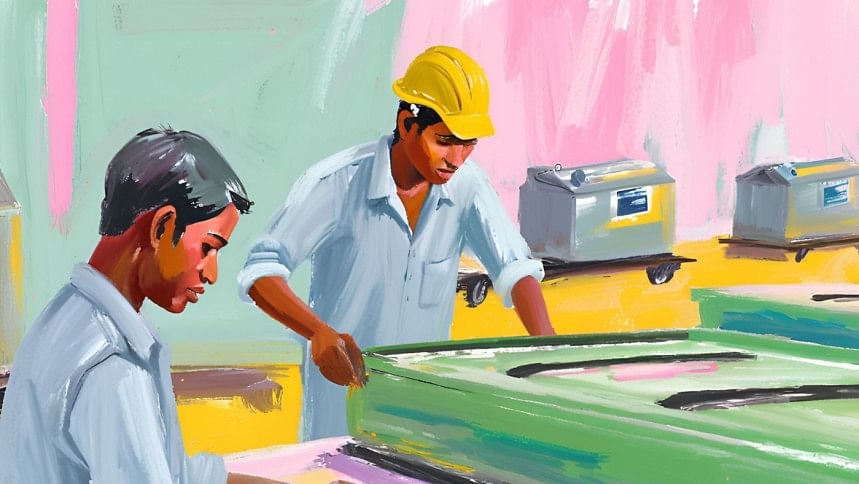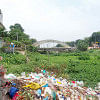Battery recycling in Bangladesh: a discounted path to environmental risk

Let's talk about something quite common in Bangladesh: trade-in discounts for old batteries. You've probably seen it—hand in your old IPS or car battery and get a sweet deal on a new one. This practice is widespread, from city markets to smaller towns, reflecting the growing demand for affordable energy solutions and vehicle maintenance across the country. Sounds like a win-win, right? Well, not exactly.
Beneath the surface of this seemingly harmless trade-in practice lies a story of environmental risks and public health hazards that we need to uncover. Right now, a question might pop up in your mind: what truly happens to these discarded batteries? So, let's get the answer.
A win-win…or is it?
At first glance, this trade-in system seems like a smart move, a mutually beneficial arrangement. Consumers save money on new batteries and sellers gain a reliable supply of used batteries, ensuring a constant flow of inventory. But here's the catch: this whole process isn't really about saving the planet, despite the superficial appearance of recycling. It's fundamentally all about economics. Sellers are not motivated by environmental concerns or a commitment to sustainability; they are part of a larger, profit-driven chain that's primarily interested in extracting valuable 'lead' from old batteries.
Think about it—lead is highly valuable and relatively easy to recycle, at least in a rudimentary sense. This inherent value is the key driver of this informal system, allowing it to thrive despite the well-documented dangers it poses to both human health and the environment. Here's how it works:
- The battery market is fiercely competitive, so sellers use discounts to attract price-sensitive consumers and secure a competitive edge.
- Lead, which makes up a big chunk (60% or 8-10 kg depending on the size) of these batteries, holds considerable economic value. Even when global prices fluctuate, as they inevitably do, lead retains a base value that makes its recovery worthwhile. This inherent value underpins the entire informal recycling system, providing a strong economic incentive for all participants in the chain.
- There is an extensive informal network for collecting and processing these batteries, involving everyone from small-time scrap dealers to makeshift smelting operations. This informal infrastructure, while lacking environmental safeguards, is highly efficient at collecting and processing large quantities of used batteries.
- Industries, especially battery manufacturers themselves, rely heavily on this recycled lead as a cost-effective raw material for producing new batteries. This creates a closed-loop system, even though a highly hazardous one, where old batteries are recycled back into new batteries, driven solely by economic incentives.
It's a money-making machine, but at what cost? The informal sector, operating outside the bounds of environmental regulations and occupational safety standards, cuts corners everywhere. And while the discounts offered to consumers are undoubtedly appealing, the hidden costs to our health and environment are enormous, far outweighing any short-term financial gains.
The hidden dangers
Let's get real about what's happening behind the scenes. Most battery recycling in Bangladesh is done informally, in small-scale workshops and makeshift operations that use crude and exceptionally dangerous methods. The process, from start to finish, is as harmful as it sounds, posing significant risks to both human health and the environment:
- First, old batteries are collected—often with no system to track or regulate them.
- Then, workers (usually without any protective gear) crack the batteries open by hand using primitive tools, exposing themselves to highly corrosive sulfuric acid and lead dust.
- The extracted lead is then melted down in elementary furnaces, often constructed from scrap materials and located within or near residential areas. These open-air smelting operations release toxic fumes directly into the atmosphere—fumes laden with lead particles, sulfur dioxide, and other heavy metals. This air pollution poses serious health risks to everyone in the neighbourhood, contributing to respiratory illnesses, cardiovascular problems, and neurological damage.
- Finally, the recycled lead goes back into the market, ready to be used in the production of new batteries or other industrial applications. This effectively completes the cycle, perpetuating the demand for informal recycling and continuing the vicious cycle of widespread environmental contamination and health risks.
What's even more alarming is the scale of this issue. This pervasive toxic contamination has far-reaching consequences for public health and environmental integrity in urban and rural areas alike. Lead poisoning isn't just a theoretical danger—it's a reality for workers and communities near these informal operations.
Communities living near these informal recycling operations often report significantly higher-than-average cases of respiratory problems, neurological disorders, kidney damage, and even birth defects. And it's not just adults; children are particularly susceptible to lead's harmful effects, like developmental delays, learning disabilities and a range of other neurological problems.
A toxic legacy
Now, let's think about the bigger picture, the long-term consequences of these hazardous practices. What kind of legacy are we leaving behind for future generations?
- Soil and water near these recycling sites are heavily contaminated with lead and other heavy metals. Imagine how that impacts farming, drinking water, and ecosystems. This contamination can persist for decades, even centuries, creating long-term environmental damage.
- Sulfuric acid from the batteries, a highly corrosive substance, is often dumped carelessly into the environment, with little to no regard for the consequences. This improper disposal leads to further damage to the surrounding ecosystems, contaminating soil and water sources, harming aquatic life, and impacting agricultural productivity.
- Air pollution from the crude smelting operations isn't just a localised problem confined to the immediate vicinity of the workshops—it contributes to regional pollution, affecting air quality across wider geographical areas. Scientific studies consistently show that toxic particles and fumes released into the atmosphere can travel long distances, eventually settling in ecosystems far from their original source and causing widespread and long-lasting harm to both human health and the environment.
And for the workers? They face daily exposure to dangerous chemicals and fumes, often leading to chronic illnesses, including lead poisoning, respiratory diseases, kidney damage, cancer, or even premature death.
It's a grim and deeply unjust reality. The lack of healthcare and insurance in the informal sector further exacerbates the issue, leaving workers and their families in a vicious cycle of vulnerability, poverty, and death.
Can we do better?
The good news is it doesn't have to be this way. Other countries have shown us what's possible. For example, Japan and Germany have strict regulations and advanced recycling technologies that make battery recycling safe and efficient. So why not us?
Imagine a system in Bangladesh where recycling is properly regulated, where workers have protective gear, and where lead doesn't end up poisoning our soil and water. It's not just a dream—it's doable. But it requires action—stringent enforcement of environmental laws, investment in better recycling infrastructure, and public awareness about the dangers of informal recycling.
We can also take inspiration from the European Union, which, for instance, has introduced Extended Producer Responsibility (EPR) laws that require battery manufacturers to take responsibility for the safe collection and recycling of used batteries. Bangladesh also has an e-waste policy that includes Extended Producer Responsibility, but responsibility across the supply chain falls through the cracks, and implementation is still up in the air.
Let's make it right
So, next time you see a trade-in discount for your old battery, think about what's really happening. Yes, it saves you money in the short term, but the long-term costs to our health and environment are too high. It's time to demand better—for ourselves, for our communities, and for Bangladesh.
Together, we can turn this toxic trade into a sustainable solution.
What can you do? Charity begins at home. Start with yourself by spreading awareness. Talk to your friends and family about the dangers of informal recycling. Support businesses that follow eco-friendly practices. And, most importantly, advocate for stronger regulations and enforcement. Change won't happen overnight, but every step we take brings us closer to a healthier, cleaner Bangladesh.

 For all latest news, follow The Daily Star's Google News channel.
For all latest news, follow The Daily Star's Google News channel. 






Comments